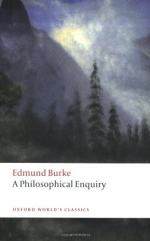
|
| Name: _________________________ | Period: ___________________ |
This test consists of 5 multiple choice questions, 5 short answer questions, and 10 short essay questions.
Multiple Choice Questions
1. What is another word for the "fitness" of objects about which Burke writes?
(a) Aptitude.
(b) Utility.
(c) Health.
(d) Condition.
2. Why is darkness shocking, according to Burke?
(a) Because darkness is inherently evil and the opponent of goodness.
(b) Because darkness is unnatural and unwelcome.
(c) Because the eye and the body do not expect nor appreciate it.
(d) Because the human brain cannot compensate for darkness.
3. According to Burke, why is sweetness pleasing?
(a) Because sweetness produces much saliva in the mouth.
(b) Because sweetness is a rare, and thus satisfying, sensation.
(c) Because the first milk of infancy is sweet, and accustoms us to the taste.
(d) Because of the regularity and smoothness of the form of sugar.
4. Which is one of the examples Burke cites to demonstrate the sublime in poetry?
(a) An elegy on the death of Milton.
(b) A description of Helen of Troy.
(c) A love poem to Aphrodite.
(d) A ballad about the battle of Culloden.
5. What type of word are man, castle, horse, etc., as defined by Burke?
(a) Imagistic words.
(b) Compounded abstract words.
(c) Simple abstract words.
(d) Aggregate words.
Short Answer Questions
1. What examples does Burke use to prove that human proportionality does not necessarily equal human beauty?
2. What visual example does Burke FIRST offer in his explanation of succession and the sublime?
3. What has Burke observed in himself regarding the passions and the body, in Section IV?
4. What is NOT a property of the beautiful in music?
5. How does Burke define "beauty?"
Short Essay Questions
1. How does Burke define proportion, and under which human faculty does it fall?
2. In his discussion of proportionality among human figures, what censure does Burke lay upon advocates proportion-as-beauty?
3. What does Burke mean by "fitness," and why is fitness not, according to him, the cause of beauty?
4. What, according to Burke, is the primary strength of poetry?
5. What does Burke propose to study in Part IV? What caveat does he offer his readers?
6. How does the body react physically to emotions of love, per Burke's observations?
7. Paraphrase Burke's definition of beauty and the distinction he makes between love and lust or desire.
8. Briefly summarize the three classes of words that Burke identifies.
9. How does Burke use women as examples to demonstrate some of the aspects of beauty?
10. Summarize the difference between Locke's idea of the nature of darkness and Burke's idea of the nature of darkness.
|
This section contains 1,177 words (approx. 4 pages at 300 words per page) |

|




